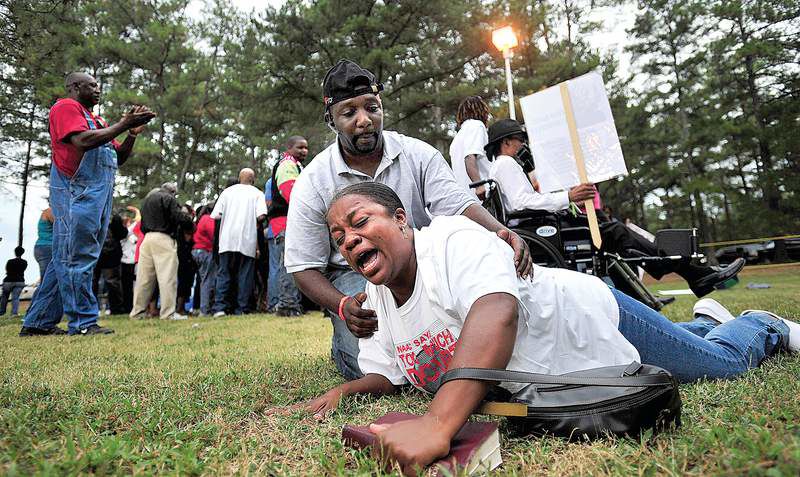Execution offers no closure to death-penalty debate
Published 5:00 am Friday, September 23, 2011

- An anti-death penalty protester is helped off the ground after hearing about a delay of the execution by the U.S. Supreme Court for Georgia death row inmate Troy Davis in Jackson, Ga., on Wednesday. Davis was later executed for the 1989 killing of off-duty Savannah officer Mark MacPhail.
After decades of litigation, the final legal ruling allowing the execution of Troy Davis was a one-sentence order from the U.S. Supreme Court so terse that it could have fit neatly into a Twitter message with room to spare.
But it is hardly the last word on the case, or in the national debate over the death penalty.
The finality of Davis’ sentence, and the outpouring of protest worldwide, leaves in its wake more than its share of questions — many that go beyond the facts of the case to encompass fundamental issues of capital punishment. Because Mark MacPhail, the Savannah, Ga., police officer he was convicted of killing in 1989, was white and Davis was black, the progress of Davis’ case over two decades widened fault lines on the death penalty and, in particular, over the question of whether a black person in the South could be guaranteed the same justice as a white one.
The nature of those doubts and the arguments for Davis’ innocence could be, and will be, debated endlessly. And while no judge who reviewed the minimal physical evidence and the testimony and witness recantations ever overturned Davis’ conviction — one judge dismissed the defense arguments as “smoke and mirrors” — activists portrayed the case as a symbol of the fallibility of eyewitness identification, of the intransigence of the justice system and of its unwillingness to correct errors — and even as a failure of the nation itself.
“The execution of an innocent man crystallizes in the most sickening way the vast systemic injustices that plague our death-penalty system,” Denny LeBoeuf, director of the Capital Punishment Project at the American Civil Liberties Union, said in a statement.
Amnesty International, which mobilized much of the opposition to the Davis execution, pledged to redouble its efforts against the death penalty in the U.S., and the executive committee of the NAACP voted this week to raise the death penalty to the forefront of its list of priorities in future advocacy.
Stephen Dear, executive director of People of Faith Against the Death Penalty, an interfaith advocacy group based in Carrboro, N.C., said his group also planned to use the momentum generated by religious leaders who opposed the Davis execution to galvanize broader opposition. “This has been a teachable moment for America’s religious leadership: that the death penalty is so awash with bias and errors that there’s no morally acceptable alternative but repealing it,” Dear said.
But can the debate over the death penalty even be called a national conversation, or is it simply two factions shouting past each other? Does it change hearts and minds, or harden advocates in their positions? Brawls, after all, do not persuade.
This execution underscores the uncomfortable relationship Americans have with the death penalty. A Gallup poll last October showed that 64 percent of those surveyed supported it for those convicted of murder, a level that had been relatively consistent for the previous seven years. Support had been higher — 80 percent in 1994 — but it has slipped, in part because of the hundreds of convictions overturned because of DNA evidence.
Gallup has asked whether people favor life imprisonment without parole as an alternative to the death penalty, and those surveyed are almost evenly split, with 49 percent supporting capital punishment and 46 percent preferring life imprisonment.
Jurors have shown a growing reluctance to vote for the ultimate penalty; in 1994, 314 people were placed on death row, but that number has dropped by roughly two-thirds since, according to figures compiled by the Death Penalty Information Center, a nonprofit group that opposes the death penalty.
Davis’ execution and the crusade it ignited ultimately bring to bear larger questions of a longing for an end to seemingly endless appeals.
William Otis, a former federal prosecutor and special White House counsel under President George W. Bush, said “there has to be finality for any system that’s going to work,” but added: “To say that there has to be finality is not to say that things should be rushed. The primary duty of courts is to get it right.”
A problem for Davis’ defenders, he said, is that judges tend to look at recantations, especially from witnesses who are in prison, “with a flinty eye.”
Otis added: “The question is not whether you can avoid errors. The only realistic question in an adult mind is which set of errors you’re going to accept. You have to be mature and honest about it, and understand there is the risk of executing an innocent person.”
To Eric Freedman, a professor at Hofstra Law School and an expert on the death penalty, the desire for finality is “understandable in some respects,” but the process of reversing convictions places too high a bar in front of defendants. At trial, he said, the state has the burden of proving them guilty, and if “one reasonable juror would have had a reasonable doubt, that would have gotten you acquittal.”






